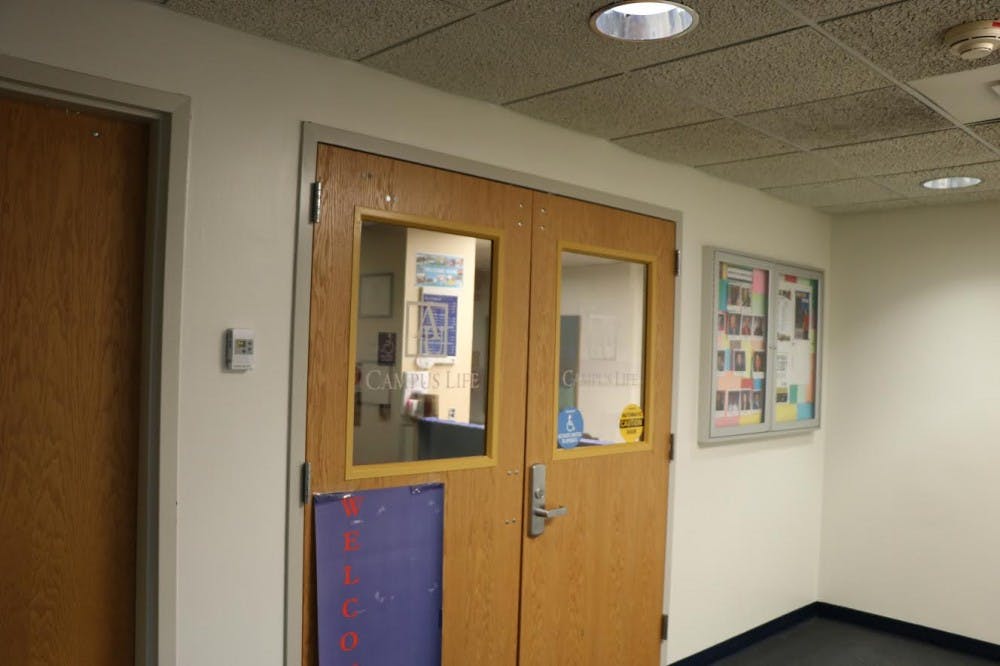Update: This article has been updated with a statement from AU Student Government.
Multiple social media pages dedicated to amplifying sexual assault survivors’ voices and posting accusations of sexual assault at American University gained thousands of followers last week, causing Greek life to come under fire and for the University to make an official response.
The trend, which has led to over 170 posts of anonymous sexual misconduct submissions, has many accusations of alleged sexual assault at fraternity parties.
The Eagle has not independently investigated the claims on these social media accounts and has decided not to name the pages for this reason.
“Honestly, I’ve never been to a frat party or anything because I’ve been scared of sexual assault,” Brenna Olson, a rising sophomore in the School of Public Affairs, said. “I guess this is kind of proving my point, even though I thought it was different at American.”
Azul Torres, a rising senior in SPA, said she submitted her accusation about being sexually assaulted anonymously after not speaking about it for three years. Torres said that she hopes that the alleged abusers will be held accountable because of how much attention these posts are receiving.
“Don’t just speak up because it is politically incorrect not to do so,” Torres said. “Take full accountability and realize that you, yourself, are part of the problem, especially if you belong to a fraternity or sorority.”
In response to these stories, some students have taken to social media to call for an end to social Greek life on campus.
Muskan Kaur, a rising junior in SPA, helped create an Instagram account and petition to call for a termination of Greek life councils after becoming engrossed in the original Instagram account.
“[The posts] felt so personal,” Kaur wrote in an email to The Eagle. “I was living, eating and breathing with these people, the common denominator, for a lot of them, was that they [are] involved in Greek life.”
She started the petition with a friend who had similar experiences, and the campaign quickly grew. Now, a Facebook page for the group has almost 100 members.
According to Kaur, people need to admit that there’s a problem, and AU must take action.
“It’s crazy how I feel so empowered after feeling so powerless,” Kaur wrote.
The account has gotten some backlash, but much of it feels misplaced, Kaur said. It must be shocking to suddenly learn that a group you’ve put so much time and money into is now being taken away.
“Years from now, people are gonna say, ‘I can’t believe that was a thing,’” Kaur wrote. “In our large scale fight against systemic racism in America, we desperately need to recognize what small scale systems exist to sustain and hide racism in our own communities.”
Torres said that the reason she did not originally join a sorority was because she did not want to deal with the “microaggressions and tokenization of women of color.” Torres said that, while she thinks that people should disaffiliate from their fraternities and sororities, she wants people to admit their complicity in organizations that are rooted in “problematic behaviors.”
After allegations posted against his fraternity, AUSG President Nikola Jok resigned on Saturday, citing mental health concerns. Jok wrote in his resignation letter that he disaffiliated from the fraternity.
“Although I have not committed any acts of sexual harassment or assault myself, I have been complicit by remaining ignorant to the actions of those surrounding me,” Jok’s statement said.
In April, Jok’s fraternity came under attack during the spring SG e-board campaign by then-presidential candidate Eric Brock. Although Jok was not named, he was the only candidate for president from the fraternity.
His fraternity did not respond to requests for comment.
On Saturday, other fraternity chapters, including Pi Kappa Alpha and Delta Tau Delta, released statements condemning sexual misconduct by members of fraternities.
Delta Tau Delta President Patrick O’Beirne and Vice President Graham Payne-Reichert said, in an email to The Eagle on Sunday, that they were planning to have a chapter meeting that night to give their members a chance to voice their opinion on how to move forward, which included some members advocating for disbandment or disaffiliation.
“Anything less than constant and conscious efforts to institute fundamental change should serve as a further justification to abolish fraternities,” they said in the email. “Again, however, this does not change the culture that allows this to continue. That being said, chapters must be mandated to do far more training.”
On Monday, AU’s Delta Tau Delta chapter said in an Instagram post that has since been deleted that, as a group, they have decided to disaffiliate. They called for all Interfraternity Council and Panhellenic organizations to follow the same course of action in hopes to end the “cycle of abuse, misogyny, and racism perpetuated by Greek life organizations.”
“We will be offering our support for existing student-led movements to put direct, immediate pressure on American University and other organizations to abolish all social Greek life,” the post read.
Sororities, including Phi Sigma Sigma, also spoke out on social media about Greek life’s “active role” in “exclusionary practices, racial injustice, and sexual misconduct.” The post stated that, in order to create an action plan, they were planning to have a conversation with their chapter.
Professional fraternities have also been vocal. The law fraternity Phi Alpha Delta released a statement recognizing that they have been “complacent” with these issues in the past and will implement new consent and implicit bias training for members.
“As potential future lawyers, it is even more crucial that we identify our biases and how we can circumvent them in our pursuit of justice and public service,” the statement read.
On Friday, the Title IX office responded to social media accounts alleging sexual misconduct, stating that they “encourage anyone who feels that they have been victim of sexual misconduct to file a complaint with the Title IX office” because the process is designed to provide “fair and comprehensive investigations.”
“The process for investigating claims of sexual assault requires that a formal complaint be filed with the Title IX office,” AU spokesperson Lisa Stark said in an email to The Eagle on Monday. “We understand these processes can be difficult, but without that formal complaint there may be insufficient information to determine the facts in the case and an investigation cannot move forward.”
Title IX is a federal law that protects against sex discrimination in education.
AU currently employs an investigative model for Title IX complaints, in which an investigator determines whether or not the accused individual is responsible. This differs from the hearing model, in which the investigation is concluded with a conduct hearing in order to determine whether or not the respondent is responsible.
Under new guidelines, recently published by the Department of Education, all students who are accused of sexual misconduct will be given the right to a live hearing. These regulations go into effect in August and are enforceable by federal law.
The Eagle reported on issues surrounding AU’s Title IX office in December, when the University had five open federal investigations into potential sexual violence violations of Title IX. Currently, three cases are open with the Office for Civil Rights, a sub-agency of the Department of Education.
The Title IX office also asked members of the AU community to be thoughtful about these social media posts as some may have “unintended consequences” and could negatively impact others or survivors involved in these stories, whether that be because there is incomplete information or that they do not want their story to be made public.
On Saturday, Know Your IX, a political advocacy group, tweeted out their support for survivors at AU who were sharing their stories on these social media accounts.
“Instead of acknowledging their failure to support survivors, @AmericanU made a statement telling survivors not to post about their assaults,” the tweet read. “If survivors felt they had any other real option, they would use it. Stop blaming survivors and fix yourself AU!”
AU Dems also released a list of demands that includes that the University investigate students who have been accused of abuse on the social media accounts, and for AU to collect feedback from students on their handling of cases.
“American University has issued plenty of statements about how they intend to protect BIPOC as well as sexual abuse survivors on campus, and it is time they finally follow through on their words,” the statement read.
On Tuesday, AUSG released a statement, calling for every fraternity and sorority to have a Title IX representative and for the IFC and PHC to implement a Diversity, Equity and Inclusion position. The AUSG Undergraduate Senate also announced the formation of commissions, the Commission on Reforming Title IX Procedure and the Preventing Sexual Assault on Campus.
“This is a student-run and student-led organization that will listen to you and voice them to administration because at the end of the day the administration has the power to enact the change we wish to see on campus,” the AUSG executive board wrote.
Olson said she hopes that this is not just a social media trend and that the University listens to its students.
“I just hope that we can take the time of everybody being invested in activism to actually change things,” Olson said.
Dan Papscun and Abbie Veitch contributed to the reporting of this article.





